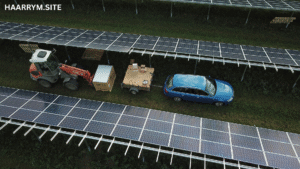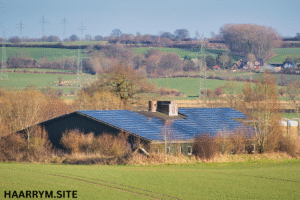More people are using solar energy solutions to run their houses as electricity’s cost increases and climate change worries mount. Making the change to clean, renewable energy is most easily accomplished and reasonably priced with a solar panel inverter kit. But just what is a solar panel inverter kit, and why would it be a wise purchase for your house?
We will explore in great detail what a solar panel inverter kit is, the components it comprises, its advantages, varieties, how to pick the correct kit, and installation and maintenance advice in this blog article.
Describe a Solar Panel Inverter Kit
Usually including solar panels, an inverter, and sometimes additional necessary components like mounting hardware, wiring, charge controllers, and batteries, a solar panel inverter kit is a packaged set. Whether on-grid or off-grid, these kits are meant to provide a simplified answer for both home or business solar power systems.
Most household appliances run on alternating current (AC), hence the inverter is a vital part as it turns the direct current (DC) power produced by solar panels into AC power.
Typical Parts of a Solar Panel Inverter Kit
Sunpanels
These take solar energy and turn it into electricity. Watts, efficiency, and brand all vary across panels.
Inverters
Converters of DC power to AC electricity are inverters. Among the numerous kinds of inverters are hybrid, microinverters, and string inverters.
Mounting Machinery
Brackets and rack systems hold panels to ground or a roof.
Charge Controllers
From the panels, charge controllers—for off-grid systems—regulate power and current to avoid overcharging batteries.
Battery Storage (Optional or Included with Hybrid Kits)
Stores extra energy for usage during sunless times.
Connectors and Cables
Essential wiring for the component connections between each other electrically.
Models of Solar Panel Inverters
Your energy requirements and grid connection will determine the many kinds of kits you may use:
1. On-Grid (Grid-Tied) Kits
Your local electricity grid is linked to these systems. When solar output is minimal, you may take power from the grid where extra produced energy finds use.
Benefits:
-
Reduce starting expenses.
-
Suitable for net metering
-
No requirement for storing of batteries
-
Designed for homes with consistent grid access
2. Off-Grid Kits
Run off from the grid and need battery storage. Ideal for isolated areas or energy independence.
The pros are:
-
Absolute energy independence
-
Works in far-off locations
-
Perfect for residences in far-off areas, RVs, and cabins
3. Hybrid Solar Systems
Combine off-grid and grid-tied possibilities. Combine solar and grid electricity, then add battery backup.
The pros are:
-
Adaptability
-
Backup during blackouts
-
Perfect for those seeking grid independence as well as dependability
Advantages of a Solar Panel Inverter Kit
✅ Cost Savings
Often times, a packaged package is less expensive than purchasing parts individually. Using solar also lowers or gets rid of power expenses.
✅ Installation’s Ease of Use
For do-it-yourselfers particularly, pre-designed kits streamline the installation procedure.
✅ Greenish
Renowned as renewable and clean is solar energy. Using less fossil fuels lowers a carbon footprint.
✅ Enhanced Residential Value
Homes with solar systems may sell more quickly and for more money.
✅ Independent Energy
Reliable electricity is provided via off-grid or hybrid kits even in cases of grid breakdowns or outages.
How Should One Select the Ideal Solar Panel Inverter Kit?
Think over the following when selecting a solar panel inverter kit:
1. Energy Consumption
Convert your typical monthly energy use from kilowatt-hours (kWh). Select a kit either meeting or surpassing this need.
2. Ground or Roof Space
Make sure the quantity of panels in the kit fits your available area. Additionally influencing output are roof orientation and shading.
3. Inverter Type
Select an inverter fit for your performance objectives and layout:
-
Simple and less expensive string inverters
-
Microinverters for shaded regions’ better efficiency and panel-level monitoring
-
Hybrid inverters in cases of battery use
4. Battery Storage (Should Necessary)
Choose if you want to save solar energy for a future use. For off-grid and hybrid systems especially, this is vital.
5. Warranties and Quality
Choose packages from reliable manufacturers with warranties covering both panels and inverters—usually spanning 10 to 25 years.
6. Local Incentives and Rules
Look for local rebates, tax credits—like the U.S. Federal Solar Tax Credit—and permission requirements.
Leading Companies Providing Solar Panel Inverter Kits
Following are some reputable solar business brands with dependable kits:
-
Rengy
-
Zero Objectives
-
eco-worthy
-
Growate
-
Bluetti—for portable devices
-
SunPower—premium systems
Make that the kit you decide on is certified (e.g., UL approved) and conforms with local electrical standards.
Installation Advice for Do-It-Your-Own Solar Panel Inverter Kits
Even while numerous kits are sold for do-it-yourself installation, it’s important to be careful and educated:
-
Always follow the manufacturer’s instructions very carefully
-
Contract a licensed electrician particularly for grid-tied systems to guarantee local code compliance
-
Local rules might call for permits or inspections
-
Safety First: Before installation, always switch off electricity and operate with appropriate protective gear
Longevity and Maintenance
Usually little maintenance are solar panel systems. The following are some suggestions:
-
Clean Panels Annually: Dirt and trash might lower performance
-
Look for any indications of corrosion or wear on wiring
-
Track performance using inverters or applications that provide monitoring
-
Should batteries be part of your system, make sure they are kept per manufacturer recommendations
A solar panel inverter kit may last 25 years or more with correct maintenance.
In the End, Is a Solar Panel Inverter Kit Appropriate for You?
Those wishing to lessen their carbon footprint, save utility costs, and achieve energy independence would find a wise investment in a solar panel inverter kit. There is a kit available to fit your requirements whether your goal is to remain linked to the grid or find a whole off-grid option.
Understanding your energy use, space availability, and local laws can help you choose the best kit and begin using the sun right now.

Questions Regarding Solar Panel Inverters
Can I install a solar panel inverter kit on my own?
Indeed, many kits are doable for do-it-yourself projects; however, for grid-tied systems, you should speak with a licensed electrician.
Do batteries come with these kits?
Not always. Usually including batteries or having them as a choice, off-grid and hybrid kits.
How long is my system going to run?
Most systems run 25 to 30 years; inverters usually need to be replaced ten to fifteen years.
Are there solar kit tax benefits?
Sure! In the United States, a federal tax credit covers up to thirty percent of the installation cost. Additionally, look for local and state incentives.
